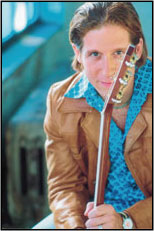
Rick Recht's album blends Jewish and African American culture in an interfaith project designed to inspire teens to fight racism.
by Gospel Gal
For Jewish rock musician Rick Recht, music, heritage and social justice have always gone together. Recht is known for writing songs that celebrate Jewish heritage and culture in contemporary forms. "I'm a teacher," he says. "I happen to play music—that's my medium."
Recently, the guitarist felt a need to take his music beyond the stage. "Over the last couple of years, I started getting an itch for coming up with a way to make these songs turn into action," he says. "I wanted to give kids an action plan—something to do with it rather than just to feel good about it."
The resulting action plan includes a CD, Tear Down the Walls, featuring Recht's contemporary, guitar-driven rock (similar to Steven Curtis Chapman or Dave Matthews), and a touch of gospel, with background vocals by black and Jewish teens. Released in partnership with the Anti-Defamation League, it's part of a four-phase program designed to train teens to fight racism and to lead diversity awareness programs. Recht, who is white, hopes the program and an album-based curriculum can spread to cities beyond his native St. Louis.
"When teenagers get into something, they become role models for everyone who's younger than them, and they become role models for everyone that's older than them," he says. "Have a teenager lead, and everyone's gonna listen."
As part of the recording process, Recht gathered a group of Jewish teens and drove down to Memphis' Stax Academy, a charter school operated by Soulsville, a non-profit organization that also operates the Stax Museum of American Soul Music. There, they joined local Jewish and African-American students in listening to two speakers: Rabbi Micah Greenstein, co-author of a
 chapter of Quiet Voices: Southern Rabbis and Black Civil Rights 1880s to 1990s, and Rev. Samuel "Billy" Kyles, an African-American pastor and Civil Rights leader who witnessed the assassination of Dr. Martin Luther King. Then, together the students recorded "Avadim Hayinu," which blends Hebrew lyrics describing the Israelites' journey from slavery to freedom with the lyrics to "We Shall Overcome." The song features soulful lead vocals from one-time American Idol contestant Philippe Crymes. The group later performed the song at Memphis' National Civil Rights Museum on Martin Luther King Day.
chapter of Quiet Voices: Southern Rabbis and Black Civil Rights 1880s to 1990s, and Rev. Samuel "Billy" Kyles, an African-American pastor and Civil Rights leader who witnessed the assassination of Dr. Martin Luther King. Then, together the students recorded "Avadim Hayinu," which blends Hebrew lyrics describing the Israelites' journey from slavery to freedom with the lyrics to "We Shall Overcome." The song features soulful lead vocals from one-time American Idol contestant Philippe Crymes. The group later performed the song at Memphis' National Civil Rights Museum on Martin Luther King Day."Just looking at our histories," says Recht, "we really do have a strong commonality of oppression as minorities, and I think we have a lot to learn from each other by reigniting the relevance of oppression, and the relevance of community, and of safety."
At Rabbi Greenstein's suggestion, Recht recorded the African-American national anthem, "Lift Every Voice and Sing" in his contemporary style. Recht's version of the historic anthem sounds similar to the praise-and-worship music one might sing in an evangelical megachurch.
"The lyric resonates with me and with the Jewish community in general," he says. "I wanted to create an upbeat, really relevant version of it."
The reaction to the piece in multicultural, interfaith gatherings has been mostly positive, partly because Recht explains the history of the poem, written by James Weldon Johnson, wherever he performs. "We have sacred pieces as Jews, and this is, certainly to the African-American community, a very sacred piece," he says. "It's very important to me that people understand the meaning, the intention, and the history of this piece every time I play it in a live setting." After his explanation, he asks people to follow the black tradition of standing when the song is played "out of respect for what this song means not just to one people, but to all people."
The album also features the St. Louis' Cote Brilliante Presbyterian Church Choir on "Let My People Go," a call-and-response chorus that tells the story of the Exodus.
"The Exodus is an experience that resonates for so many religions, particularly the Jewish and African-American experience of oppression," he says. "But you hear those words come out of a lot of people, from a lot of different backgrounds, because most religions throughout history, if not in the present, know what it means to be oppressed."
To Recht, learning from the traditions of others strengthens his own commitment to work for justice.
"When you know what it means to be oppressed, you know what it takes to survive. And you know why you need to believe in God and why you need to have faith, and why you need to have love."
No comments:
Post a Comment